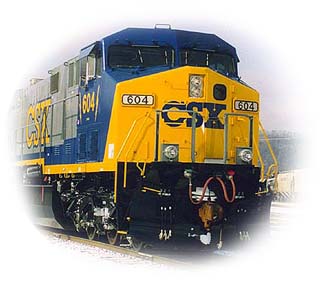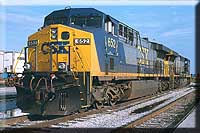
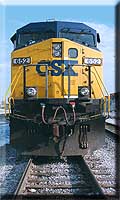
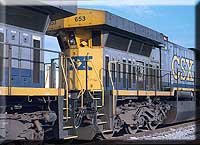
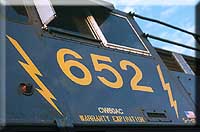
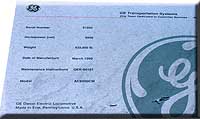

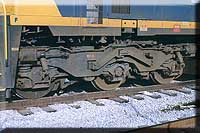
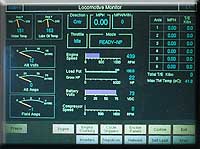
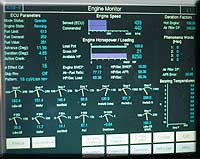
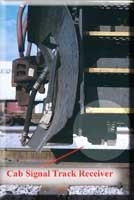 |
|
|
|
|
The Power that be!
Stretching 76 feet and weighing 216 tons, the AC6000CW is one of two American made diesel locomotives rated at 6,000 horsepower. Along with ElectroMotive's SD90MAC-H, these are the most powerful diesel locomotives on the market today.
While units in decades past have reached 6000 hp or more, this was done with
the use of 2 prime movers. The AC6000CW uses only one prime mover to reach
its goal. Reaching the 6000 hp plateau has been quite a struggle for both
the builders and the railroads that ordered these mammoth locomotives. First
and foremost, new prime movers had to be developed to reach the 6000 hp goal
as currently available designs were already operating at a peak horsepower
in the 4000-5000 hp range. GE chose to form a partnership with Deutz MWM
of Germany and design a new prime mover that would be capable of producing
6000 hp. This was in 1994, shortly after CSX ordered the first 3 AC6000CW's
(classed CW60AC by CSX).
During 1995, GE released the first AC6000CW, GE
#6000. This unit was called the "green monster" or "green machine" by many
because of the green paint scheme the unit wore as well as the large size
of the locomotive. During 1995, 13 additional AC6000CW's were constructed,
3 for CSX and 10 for Union Pacific. After testing within the confines of
the GE facility in Erie, Pennsylvania, the units were released for service
in September 1996. CSX #602 was the first to be delivered. To the surprise of railfans and company employees, a modified CSX paint scheme was introduced
on #602. It included large CSX lettering on the hood, which was yellow, and outlined in blue. On the cab sides, a lightning bolt was stenciled at each end of the
number. This gave the new units a very bold look and so far is only used
on the AC6000CW's. During a ceremony at the B&O Railroad museum the #602
was christened "Spirit of Maryland". With this, the AC6000CW saga had begun
on CSX.
Problems
Initially these 3 units were used in all types of service. They could be found hauling anything from unit coal trains, hotshot intermodal trains or a lowly manifest. More often than not, these units were operated with any other locomotives on the roster, though at times, the units would be paired together, and on a few occasions all 3 might be found together. All was not well in CSX land. The units soon began to earn themselves a bad reputation with crews and shop forces due to various mechanical problems.
The most severe problems were with the new HDL
prime mover. There was a major vibration problem, which resulted from the
engine block walls being too thin. This caused problems with the pair of
turbochargers. GE had already redesigned the prime mover once because the
original prime mover that was shipped from Germany was found to be too large
and would not fit in the locomotive. This was because of a misunderstanding
between GE and Deutz. These problems caused GE to push back production of
the AC6000CW until 1997.
Resolution
GE worked and redesigned the HDL prime mover
for the second time.The new version was dubbed the "stiff HDL" because it
had thicker block walls than the original. Special braces were mounted on
the turbochargers and this combination solved the vibration problem. Even
after the vibration problems were solved, the HDL prime mover was still plagued
with various problems. Despite the problems, testing and evaluation of the
pre-production AC6000CW's continued. During early to mid 1998, CSX #600 was
modified with new software and had its older hi-ad trucks swapped out for
a GE's new and experimental "Generation 2" steerable trucks. This was done
for part of an experiment, as GE wanted to maximize the tractive effort of
the new locomotive. Sister unit #601 was fitted with the Generation 1 steerable
trucks and the pair was tested in helper service. They spent 2 weeks in this
service allowing GE personnel to obtain data that would possibly improve
the performance of the units.
Production
About the same time that GE personnel were evaluating CSX #600 and 601, full-scale production on the AC6000CW began. The first
production units to be delivered to a railroad were Union Pacific #7512 and
7513. They were delivered after extensive testing by GE and soon more units
were delivered. The first of the CSX production units were not delivered
until December.
On December 29, 1998 CSX took delivery of AC6000CW's
#603 and 604. The units were nearly identical to the original CSX trio, but
the new units rode on GE's Generation 1 steerable trucks. The units were
only in service on CSX for 2 weeks when #604 suffered a blown prime mover,
which placed it out of service. Not long after this, GE began to deliver
more and more of the AC6000CW's to CSX. By June 1999, CSX #600-653 were in
service throughout the system. During September 1999 production of the AC6000CW's
resumed and as of this writing units up into the 670 series have been delivered.
The entire order, which was for 114 units, should be completed in early 2000.
When complete, CSX will have AC6000CW's #600-699 and 5000-5016.
The preferred power for CSX intermodal trains is high horsepower, high speed capability. Typically used in 2-unit sets, they have been seen with 3 or 4 60s in lead. GE's newest AC60s are equipped with cab signals which allow them to run in lead over former Conrail lines and other cab signal required mainlines. Older AC60s will be, or already have been, retrofitted with the same cab signal equipment..
Conclusion
With over 70 units delivered and more on the way, CSX holds title to the largest fleet of 6000 horsepower locomotives in service with UP being the only other American railroad to operate such units. BHP Iron Ore located in Austrailia became the 3rd owner of the AC6000CW with a total of 8 units. Though they are still working out various problems and bugs, CSX is sticking by GE with the new AC6000CW. While additional new locomotive orders haven't been placed by CSX for delivery in 2000 and beyond as of yet, additional AC6000CW's are not out of the question. As more of these units are delivered be sure to keep your eyes peeled because you may just find an AC6000CW coming to a CSX line near you! |
